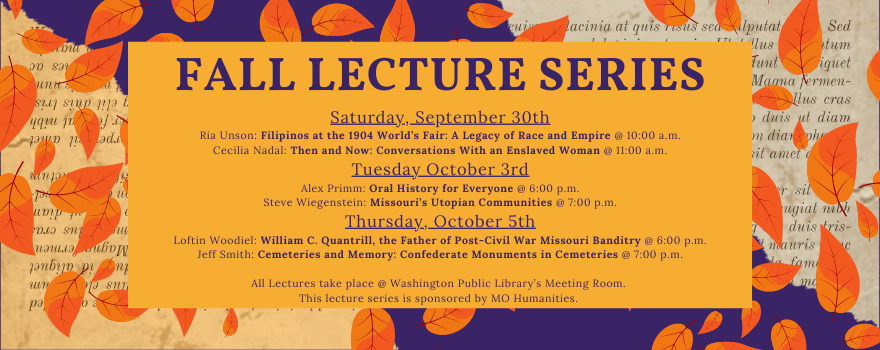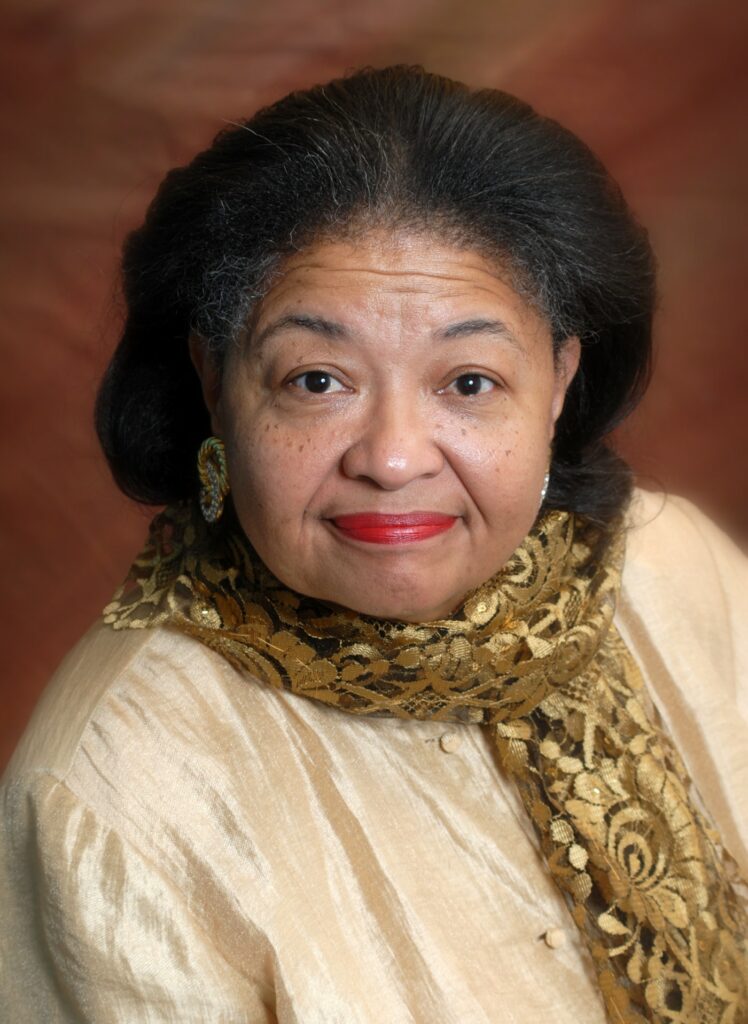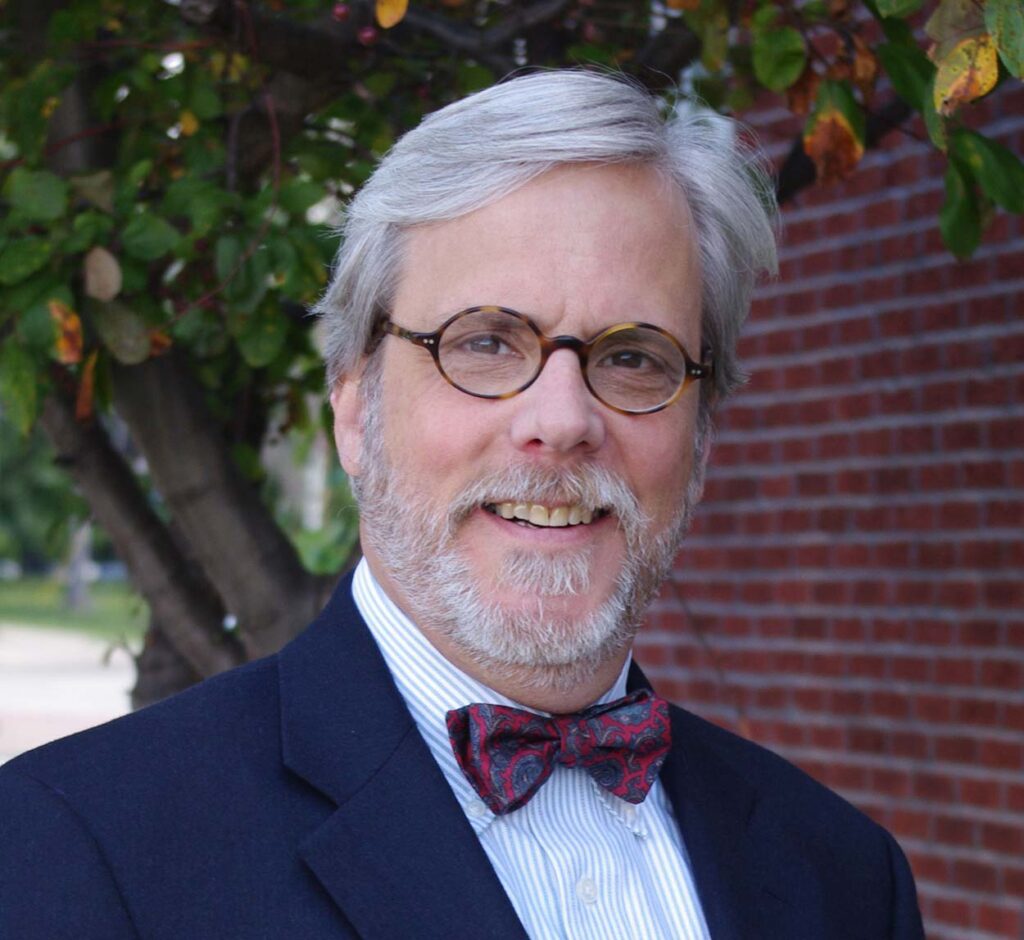Fall Lecture Series Continues Tuesday Oct 3

The Washington Public Library’s Fall Lecture Series takes place from Saturday, September 30 through Thursday, October 5.
All Lectures take place @ Washington Public Library’s Meeting Room. This lecture series is sponsored by MO Humanities.
Program Schedule
Saturday September 30
Ria Unson: Filipinos at the 1904 World’s Fair: A Legacy of Race and Empire, 10:00 a.m.
Cecilia Nadal: Then and Now: Conversations With an Enslaved Woman, 11:00 a.m.
Tuesday October 3
Alex Primm: Oral History for Everyone, 6:00 p.m.
Steve Wiegenstein: Missouri’s Utopian Communities, 7:00 p.m.
Thursday, October 5
Loftin Woodiel: William C. Quantrill, the Father of Post-Civil War Missouri Banditry, 6:00 p.m.
Jeff Smith: Cemeteries and Memory: Confederate Monuments in Cemeteries, 7:00 p.m.
Lecture Descriptions
September 30th
10:00 AM Ria Unson
Filipinos at the 1904 World’s Fair: A legacy of Race and Empire

One of the most popular attractions at the 1904 World’s Fair was the Philippine Exhibit, a 47-acre site that for nine months became home to over 1,000 people on display. Ria Unson, St. Louis-based Filipino American artist and researcher, traces the legacy of the fair as a descendant of one of those people. Learn about how the image of Filipinos constructed at the fair was a method used to gain support for American imperialism and to domesticate the immigrant workers of St. Louis.
September 30th
11:00 AM Cecilia Nadal
Then and Now: Conversations With an Enslaved Woman

History gives us the tools to analyze problems in the past so that there is a better understanding of the present and future. But what happens if someone from the past comes to us in the present to discuss where we are now! Caroline is a former enslaved woman (played by Cecilia Nadal) who comes to us in the present using the wisdom of her past. She readily engages in conversation that probes the “whys” and “why nots” of our relationships with each other then and now. She comes to learn, share her experiences not as an object of history but as a woman wanting to see unity in the world by sharing one on one in a humanistic way. THEN AND NOW: CONVERSATIONS WITH A SLAVE uses history and performance art to create a relationship between the former slave and audience members as observers and participants. Caroline will share her personal story and guide the conversation. Audience members will be invited to have a one-to-one conversation without interruption with Caroline in front of the audience. The questions are whatever the audience member desires based on history and/or the “here and now.”
October 3rd
6:00 PM Alex Primm
Oral History for Everyone

Drop modern Greece into the middle of America. That’s roughly the size of the Ozarks: 50,000 square miles. But the Ozarks has one-tenth the number of residents. I’ve spent 40 years working as an oral historian traveling from Sallisaw, Oklahoma, to Saint Louis; Little Rock to Columbia and many towns in between. Here are my most inspiring stories. I want to share people I cannot forget. I hope to encourage others to interview families and friends. Oral history is a natural trait. We all appreciate true struggles. Local history influences everything we do. In early 2022 McFarland Co., an academic publisher in North Carolina, brought out my ‘Ozark Voices: Oral History from the Heartland’. Some 60 chapters share accounts sponsored by the U.S. Army at Ft. Leonard Wood, the Forest Service, Geological Survey, National Park Service along the Ozark National Scenic Riverways and other institutions. This program on Ozark oral history will offer stories and encourage people to record their family history to make it useful for the future. Modern technology makes oral history possible for everyone. But it has to be done right to make it valuable. This foundation is what I offer.
October 3rd
7:00 PM Steve Wiegenstein
Missouri’s Utopian Communities

Nineteenth-century Missouri was home to several alternative communities, often termed “utopian communities” for their emphasis on social betterment and a different way of life. But although their neighbors sometimes considered these utopians odd or eccentric, they were often within the mainstream of progressive social thinking of the time. Steve Wiegenstein has been researching these communities for decades, both as a scholar and in his role as a leading historical novelist. In this presentation, he will invite discussion of Missouri’s well-known and lesser-known utopian communities, including religious communes, secular communities, and those in between.
October 5th
6:00 PM Loftin Woodiel
William C. Quantrill, The Father of Post-Civil War Missouri Banditry

During the American Civil War, Captain William C Quantrill commanded a band of Confederate irregulars who reeked death and destruction throughout the Missouri and Kansas borders. Tactical and technical perfection was a trademark of his organization. Prior to the war, Quantrill was a school teacher in the state of Ohio. A number of Quantrill’s men continued to hone their skillset, maintained these deviant behaviors and channeled them into post-war career banditry opportunities; e.g., James Robert Cummins, the James Brothers (Jessie and Frank), and the Younger Brothers (Cole, Bob and Jim). Just as a teacher motivates his students to adopt specific standards of academic and social behavior, did Quantrill’s pedagogical skillset propel his subordinates into deviant careers? This interdisciplinary research design employs historical context analysis, psychological evaluation of motivation in a running text, and the application of criminological theory.
October 5th
7:00 PM Jeff Smith
Cemeteries and Memory: Confederate Monuments in Cemeteries

Cemeteries are seen as both sacred spaces and secular tools for articulating and preserving the collective memory a community wants to preserve. The monuments, cemetery design, and gravestones hold a version of a community’s collective memory. When additional monuments are placed in these spaces, they become part of that memory as well. Presented by a nationally recognized scholar in cemeteries and death studies, this lecture will examine the ways Confederate monuments in cemeteries represent a special case for understanding the Lost Cause in the 21st century.
